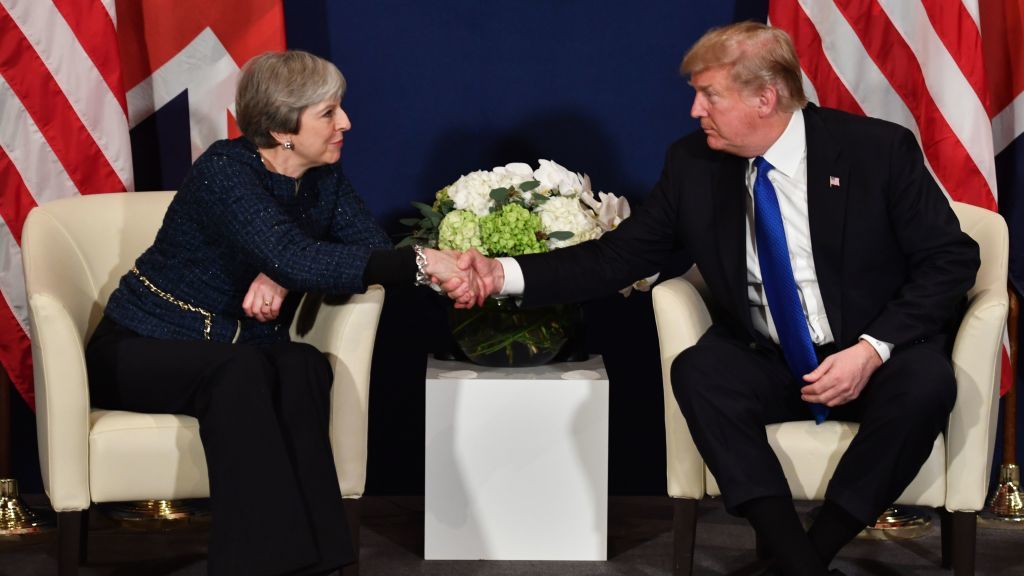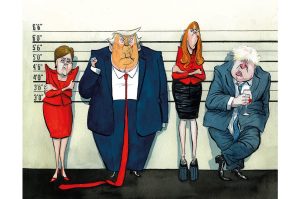The resignation of Theresa May, continuous Brexit chaos, and probable anti-Trump protests will all present a lively backdrop to President Trump’s upcoming state visit to the UK. Despite the US and the UK appearing to move toward inward-looking foreign policies in recent years, new survey data show that the public in both countries share more of a global outlook than their leaders might realize.
Trump was elected on an ‘America First’ platform and has applied tariffs to trading partners, questioned the utility of alliances, and continues to push for more restrictive immigration policies. May was elected on a promise to deliver the UK’s departure from the EU, with cutting back on immigration a key part of that promise. Her successor is likely to promise similar policies.
Recent polling from two think tanks, the British Foreign Policy Group (BFPG) and the Chicago Council on Global Affairs, has found that both Brexit and Trump supporters reject key elements of the internationalist status quo. Immigration preoccupies both groups. In Britain, Brexit supporters see immigration as the biggest foreign policy issue. Brexit supporters are also the least likely to support British membership of international organizations, and they overwhelmingly want the world to see the British government as representing the interests and welfare of its own people first (72 percent). In the US, Americans with a very favorable view of Donald Trump — his core supporters — are the most likely to say that immigration is a critical threat to the United States (80 percent versus 39 percent overall). They are also the least likely to support US participation in various international agreements, and the most likely to say that it is better for the United States to be feared than admired (56 percent vs. 26 percent overall).
But these attitudes have limited appeal beyond their core groups. Large majorities of both Britons (78 percent) and Americans (70 percent) support their countries taking an active international role. Although their governments have differed on foreign policy issues ranging from Iran to Huawei, Americans and Britons still share a similar global outlook. Americans still rate the UK as one of their most favored countries, just behind Canada, and half of Britons continue to look favorably upon the United States.
On trade, there is more mutual enthusiasm than there has been in a long time. An all-time high, 85 percent of Americans, view international trade as good for consumers like themselves. Over a third of Brits view the promotion of free trade as a key role for the UK on the world stage. Amid talks of post-Brexit trade deals between the US and the UK, US goods exports to the UK between 2017 and 2018 rose to 17.7 percent, and goods imports from the UK rose to 14.6 percent. Once we look beyond political leaders and political rhetoric, business is booming.
Bilateral and multilateral security ties are also strong. NATO continues to attract significant support on both sides of the Atlantic, with 69 percent of Britons wanting the UK to remain a member, and 75 percent of Americans wanting to maintain or increase their commitment to the alliance. The UK is the only Western European state to consistently honor its NATO commitment of spending 2 percent of GDP on defense.
Recently, Foreign Secretary, Jeremy Hunt spoke about doubling the UK’s defense budget, partly as a sign of Britain’s commitment to NATO and its military alliance with the US. These political efforts to strengthen current ties come at a crucial juncture when 57 percent of Americans feel the US is losing allies, and the UK is attempting to leave the EU.
Yet Trump’s upcoming state visit might not be a smooth one. Theresa May is on her way out, and Trump’s personal unpopularity has led to many observers questioning the strength of the ‘Special Relationship’. Trump has previously berated May for not listening to him on Brexit. He has argued on Twitter with London Mayor Sadiq Khan. He has retweeted an incendiary anti-Muslim video from a fringe group of British extremists, which May publicly criticized as ‘wrong’. He has, accidentally of course, infringed royal protocol when meeting the Queen. And neither Trump nor May is very popular with each other’s general public. While Theresa May garners a 46 percent favorable rating from Americans, only 21 percent of Britons approve of Trump. Public protests are planned for his visit, and the infamous baby Trump blimp is expected to reappear in the skies over England.
Personal relations between leaders do play an important part in the US-UK relationship. But, as May’s recent resignation shows, the deeply rooted and complex bilateral relationship will outlast individual leaders. Done right, Trump’s visit could provide an excellent symbolic opportunity to move on from damaging verbal exchanges, and shift the focus toward the global vision shared by citizens on either side of ‘the Pond.’ Beyond the tension and wobbles at the top level, there lies a strong bedrock of goodwill, a common global outlook, and a desire to work together. In an increasingly uncertain world, that should not be overlooked.
Edward Elliott is Research and Operations Manager at the British Foreign Policy Group. Dina Smeltz is a Senior Fellow at the Chicago Council on Global Affairs.


















